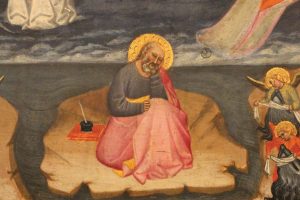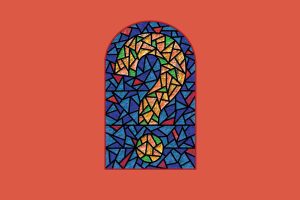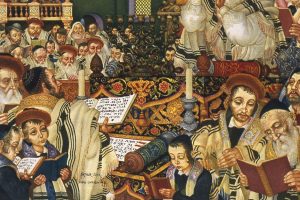Living in daily expectation of "seeing God,"Father Godfrey Diekmann, O.S.B. shares his thoughts about heaven, beauty, and deification.
A legendary teacher, speaker, and preacher, Benedictine Father Godfrey Diekmann, now 93, has played a key role in the development of Catholic liturgy in the 20th century. He edited the liturgical journal Worship from 1938 to 1967, served as an expert at the Second Vatican Council, helped organize national and international liturgical weeks, and was a founding member of the International Commission on English in the Liturgy-the body responsible for translating Catholic liturgical texts into English. The following, drawn from two of Father Godfrey's legendary Christmas letters to family and friends, alludes to his recent physical crises but also expresses his vision of divine beauty and the ongoing importance of Vatican II.
Two years ago I was told I had, at most, two months to live because my heart was functioning at only 35 percent of normal. But God obviously had other plans. And now he has done it again! I'm told that, healthwise, I have made remarkable progress, and I do manage to walk several hundred yards every day with my sturdy walker. I am happily enjoying the life that God is allowing me. Only now, it seems to me, have I really begun to appreciate the blessing of community life: of loving and supportive brothers.
It is also truly exciting and grace-filled to live in daily expectation of "seeing God." Rarely a day passes without some phrase in the daily psalmody taking a new relevance. So I choose that phrase for a day or more as a "mantra." During Advent, the frequently recurring refrain "Come, Lord Jesus" assumed a totally new dimension.
But why the delay of sister death, of my final homecoming?
Yes, it is time for repenting, especially for not heeding sufficiently Saint Leo's famous dictum: "Christian, remember your dignity," of sharing the divine nature, of truly being sons and daughters of God. But also, perhaps, this is a time to gather my thoughts about heaven and share them. For I am convinced we have seriously undervalued God's final and greatest gift to us. A beautiful place
Last year in my letter I wrote of heaven as a wedding feast, as a "seeing," our experiencing God with the ecstasy of honeymoon love. Heaven is eternal, supreme life-not just eternal rest.
God is not only the true and the good. God is also beauty. Heaven, therefore, means experiencing infinite beauty, for each one of us to his or her ultimate capacity. In the Greek translation of the creation story in Genesis, after each day of creation, "God saw that it was good." In the original Hebrew, the word connotes both good and beautiful. I understand now why the two greatest anthologies of Eastern Christian ascetical and mystical writing have been called philokalia: love of (divine) beauty.
God has granted us vivid foreshadowings of that heavenly joy. But it is only now that I am beginning to recognize them. For instance, one of the memorable experiences of my life was to hear Mstislav Rostropovich playing Bach's unaccompanied suite for cello for a jam-packed audience in the Kennedy Center. When he finished, he received the ultimate tribute: a long, total silence-until some barbarians started clapping loudly.
What a true instinct it was, therefore, that in Roman catacombs, besides the paintings of Christ in historical scenes, the only two ways of representing him metaphorically were as the Good Shepherd and as Orpheus, the god of beauty, seated and plucking his harp, surrounded by enraptured or dancing animals. And this at a time when paganism still posed a threat. I also particularly like Origen's and Clement of Alexandria's interpretation of the opening line of several psalms, "Let us sing to the Lord a new song." Christ is that song, they said-a song, not a prose word.
For a long time I have been convinced that if a command of the church cannot be carried out except in an ugly fashion, that command is wrong. And one's duty is to try to change it.
Counting on Vatican II
Perhaps I also can, in a very limited fashion, be useful in clarifying major reasons for optimism about the miracle of the Second Vatican Council in what for so many are troubled and confused times.
Some months ago I counted the references in all the documents of the Second Vatican Council. From scripture, 1,161; from patristic authors, 337; from all post– patristic writers, 42 (of which 26 quotations were from Saint Thomas Aquinas).
Similar results were obtained from the Catechism of the Catholic Church, which claims to represent council documents in catechetical form. From scripture, 4,165; from patristic authors, 342; from all post– patristic writers, 115 (of which 61 are from Saint Thomas Aquinas).
I'm happy to let Pope John Paul II summarize the conclusion to be drawn: "It has been said with good reason that in the history of the church all true renewal has been linked to the rereading of the church fathers. And what is true in general is true of the liturgy in particular" (message to the bishops of the western United States at their ad limina visit, Oct. 9, 1998).
Vatican II clearly was a return to scripture and tradition-above all, that tradition of patristic times that in a unique way complements scripture. To be true to the miracle of Vatican II, there is urgent need of recovering a new, fuller understanding of patristic glad tidings, above all the good news that "we are not merely called but are the sons and daughters of God" (1 John 3:1). Yes, our deification or divinization.
The Vatican document that has stirred the most controversy recently, especially in ecumenical circles, has been Dominus Iesus. Its secondary purpose seems to have been to underscore the matters that separate all others from the Roman Catholic Church (shades of the time, not so long ago, when Catholics were forbidden to pray with those "outsiders," or when Boston's Father Leonard Feeney, S.J. evoked strong support in his manner of proclaiming, "Outside the church there is no salvation").
I am ever more convinced that the only adequate answer to this "outdated" document is "incarnational theology," the doctrine of the cosmic Christ, especially of Ephesians and Colossians. By Jesus' Incarnation, we-all of us-are brothers and sisters in Christ. God became human so that all humans might share in God's divine nature, as we still pray, in every Mass, at the preparation of the gifts.
Pray for us
I made a "contract" some time ago with my sister Marie (now in a very advanced stage of Alzheimer's disease) that whoever gets to heaven first will take special care of the other. Now, I suppose, the chances are even. Please pray for both of us, as I will for you, from the "wedding banquet's" vantage point. And herewith my promise that all of you will be on page one of my heavenly list of friends and benefactors.
This article appeared in the August 2001 issue of U.S. Catholic magazine (Vol. 66, No. 8, pg. 32-33).













Add comment